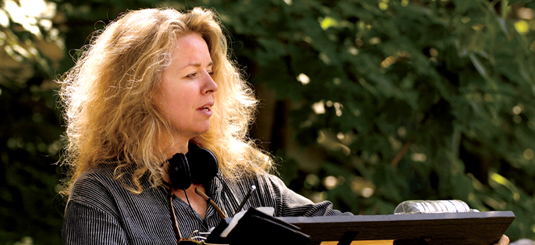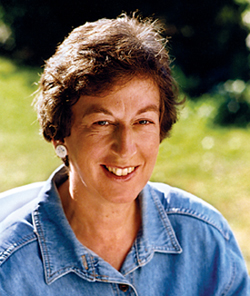

Patricia Rozema’s
Remarkable Teacher Marguerite Van Die
Patricia Rozema attended Lambton Christian High School in Sarnia. The school opened the year Rozema started high school in 1972 and closed in 2002. Marguerite Van Die taught at the school from 1975 to 1979. She has taught history at Queen’s University since 1985.
by Joyce Mason
given the strong literary thread woven through the work of filmmaker Patricia Rozema, one might be forgiven for guessing that her most influential teacher was an English teacher or at least an enthusiast of film or stage.
Patricia Rozema’s first feature film, I’ve Heard the Mermaids Singing, took its title from a line in T.S. Eliot’s The Love Song of J. Alfred Prufrock. Her most celebrated work, Mansfield Park, is an exquisite interpretation of that 19th-century novel, reflecting the spirit of Jane Austin’s letters and early writings. Rozema has worked with icons of English-language theatre – Harold Pinter played Sir Thomas Bertram in Mansfield Park.
Even Rozema’s most recent child-friendly production, Kit Kittredge: An American Girl, is based on a novel from the popular children’s history series.
But Rozema grew up without exposure to film and television and the teacher who most sparked her interest and inspired her future path in life was Marguerite Van Die (pronounced Van Dee), the French and history teacher who arrived in Sarnia just in time for Rozema’s final year of high school.
“She taught subjects that I didn’t really pursue – French and history. But she taught in such a way that I felt I was learning about life, not just a subcategory of life.”
Rozema says that when it came to teachers, for her, the subject matter was less important than the enthusiasm and love of learning they brought to the classroom.
“She taught in such a way that I felt I was learning about life.”
“All the way through my school career, I would do exceedingly well in some subjects and then not really bother with others,” Rozema recalls. And the subject of her attention varied from year to year.
Still, Grade 12 French was not one of the subjects in which Rozema excelled.
“She was not a stellar French student, but she performed fairly well,” says Van Die. “She and her friends had fun and I don’t think that she killed herself working.”
“She was an interesting young woman – bright, a bit impish,” she adds.
“Like so many young women, she was going through a fairly rebellious period when I knew her and I probably helped in the usual way that teachers help their students – by taking an interest, by believing in them, by encouraging them.”
For Rozema, Van Die provided a glimpse of a world outside of the small school at the centre of the immigrant Dutch Calvinist community in Sarnia where she was raised.
“I was in a small immigrant community within a small town,” says Rozema. “She brought a very sophisticated urban mentality and aura, and I was excited by her whole style as a human being. It made me wish to … play in a bigger world.
“There were 11 kids the first year the school opened and each year they added a grade. All of us were children of Dutch immigrants. Except for one Catholic student, all the teachers and students were pretty much Dutch.” Rozema says that the community was not a sophisticated environment “except religiously,” but education was highly valued.
“My father came to Canada when he was 28. He spoke four languages and was a chess champion and had a deep hunger for knowledge,” she says. And while the idea of higher education was always more or less assumed, “This teacher really made me want to go – definitely – on to higher education. She made it clear that I had to.”
In part, Van Die did this by her own continued learning. She was pursuing graduate work at the University of Western Ontario while teaching in Sarnia. And in part, she encouraged Rozema by getting to know her.
“There is a certain amount of putting yourself in the position of the students and listening to them, trying to be understanding, letting them vent.
Van Die notes the general upheaval of teen years: They are at a point in their lives when they have so many impulses and urges and needs, so many things they want to do and so many frustrations they experience – because often they can’t do these things. But sometimes the classroom can become a special place of escape and discovery. “You can make a place for them in the classroom.”
And as well as “letting them vent” and wanting to understand them, Van Die talks about helping them redirect that energy and frustration. “You can take them out of themselves and distract them with what you’re teaching.”
She says that, for Rozema, she happened to arrive at an important transition point: “My first year there was her last year. It was a small school where everyone knew each other. She had known all the people in her class since Grade 1 so it could be a little claustrophobic. And she was very, very ready to get out.”
Certainly Rozema saw Van Die as a role model. She had lived in cities and other countries. Being a French teacher, she told them about France and took them to Montréal and Québec City. As an adult, she had lived in California, the Netherlands, Vancouver and Toronto.
 |
| Marguerite Van Die |
“I find it very hard to think of myself as sophisticated or worldly,” says Van Die, “but in her perception, I probably was.”
Van Die talks about the need to really listen to students and clearly she was successful. Rozema says, “I was addressed, when I would speak with her, as a full human being and not just as a kid in the class.”
Aside from French class, Van Die would suggest books to Rozema – the history of ideas especially.
“I went on to study philosophy at university because of her, I think,” says Rozema, who did a double major in philosophy and English literature.
She remembers in particular Van Die saying once that every square inch of the planet is fascinating if you look at it closely enough. “And every person, tree, rock, house and cloud has many, many different sides – historical, aesthetic, chemical, biological … There are an infinite number of angles that you can take. And to call something history is just looking through one particular pair of glasses.”
Rozema took this idea of looking at things from various angles to heart in university – planning courses so that she could cover philosophy and literature from the same historic period during the same semester. She found the philosophers were often a little behind those writing literature. “The heart leaps forward more freely than the mind,” she concludes.
Rozema seems to appreciate the demands and importance of teaching.
“Society in general does not reward the profession at anywhere near the level it should. Teachers have an impact greater than any politician and probably more than any university professor.
“Your sense of the future and your contract with learning is established before you reach your twenties. You are learning how to learn and you learn the desire to keep trying – or not.”
Rozema also recognizes that the challenges teachers face are very real: “The spark is so easy to put out.
“Many kids who have problems and seem not to want to learn, it’s because they think it looks better to be the cool, negative one than it does to be the one trying and failing and looking stupid. So it can feel better to be destructive. The human desire to hang on to one’s dignity is stronger than just about anything.”
You need a strong teacher to counter the negative influences in students’ lives that might lead them to give up. “Children aren’t that great at abstraction but they do feel energy,” she says. “They feel the excitement of someone who is sharing their deep love of something.
“If teachers can communicate their own passion – no matter what the subject – it can inspire a passion for learning, whatever your personal interests end up being.”
|













